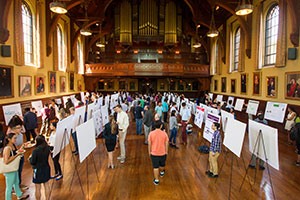PROVIDENCE, R.I. [Brown University] — Nestled within the historic College Hill neighborhood on Benefit Street, the Nightingale-Brown House stands out for its colonial-style architecture and its deep ties to Brown’s namesake. The distinctiveness of the 1792 home means it quite often captures the interest of visitors.
This summer, the house also captured the interest of a team of undergraduates who created a self-guided tour for mobile phones as part of an I-Team UTRA project at Brown. Unlike traditional UTRAs, which offer opportunities for independent work with faculty on focused research topics, team-based UTRAs come together when the breadth of a topic demands a diverse set of skills.
As one of five students who spent the summer researching artifacts, delving into histories and writing about findings, rising sophomore Jennifer Shook immersed herself in the house’s archives, created content for the tour and discovered an interest in American studies along the way, which she hopes to integrate into her political science concentration.
“It was interesting for me because I never spent 10 weeks intensively researching a topic in academia,” Shook said. “It taught me what I’m interested in.”
Having worked in the Mark Twain House and Museum in Hartford, Connecticut, during her high school years, Shook stumbled upon the project while considering I-Team UTRAs and quickly seized the opportunity to learn about a comparably historic site. Shook said that one of the allures of studying the house, home to five generations of the Brown family, was the team’s opportunity to decide which stories to tell.
“John Nicholas Brown II and his family are the most obvious people to tell the stories of,” Shook said. “But I think it's just as important to tell the other less obvious narratives associated with the home. And this is really just a beta version of the tour. Hopefully, in the future, the tour will discuss issues of privilege and the family's ties to the slave trade in more detail than we were able to do in the amount of time we had.”
As part of the project, each student selected five objects to study in a particular room. The group examined restored spaces and their objects, including historic furniture, fine and decorative arts and interior finishes that reflected the lifestyle of the Brown family. In stark comparison to the tours offered at the Mark Twain residence, which weren’t scripted but were well established, this project was different because “the group was starting from square one,” Shook said.
One of the artifacts that caught her attention was a reproduction of a Goddard-Townsend secretary desk. Shook learned that the original desk commanded a record-setting price of $12.1 million when it was sold in 1989 to raise funds to save the home from severe water and termite damage. She also discovered a trick for identifying the valuable desks — looking for a block front and carved seashell designs — which were made in Newport prior to the Revolutionary War.
“Even in such a specific field, there's just so much to know and learn,” Shook said. “We tried to make something that was accessible and interesting to the public.”
As content is finalized over the next two months, the digital tour will go live and visitors to the Nightingale-Brown House — and to the John Nicholas Brown Center for Public Humanities and Cultural Heritage, which calls the building home — will have the chance to explore the house’s history in depth.
